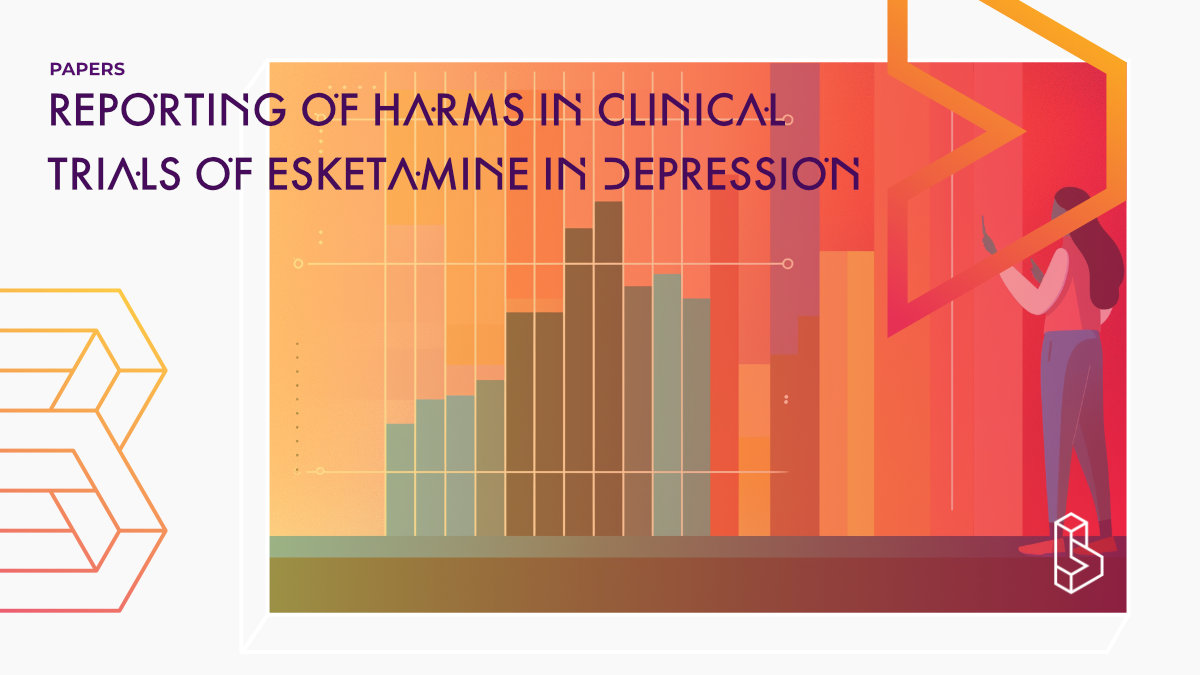This systematic review (s=10 trials) evaluates the quality of adverse event (AE) reporting in published clinical trials studying esketamine for resistant depression. It reveals that 41.5% of serious AEs and 39% of non-serious AEs were not reported in the published articles compared to ClinicalTrials.gov, with the majority being psychiatric and cardiovascular events and 94% concerning patients from esketamine groups. The study concludes that the quality of AE reporting in esketamine trials is poor, making the assessment of benefits/risks based on trial publications flawed due to the inaccuracy and incompleteness of harm data.
Abstract of Reporting of harms in clinical trials of esketamine in depression
“While previous systematic reviews of trials evaluating conventional antidepressants highlighted inadequacies and inconsistencies in adverse event (AE) reporting, no evaluation is available on esketamine in resistant depression. The objective of this review was to assess quality of reporting AEs in all published clinical trials studying esketamine. It also aimed to compare the proportions of AEs reported in journal articles to those recorded in the ClinicalTrial.gov Registers. Clinical trials evaluating the efficacy and safety of esketamine in depression were searched using Medline and ClinicalTrials.gov. The quality of reporting harms was assessed using a 21-item checklist from the CONSORT Extension of Harms (1 point by item). The total quality score was graded into four categories: high (17–21), moderate (12–16), low (7–11) and very low (0–6). Ten clinical trials were included in the analysis. Nine trials were classified as ‘low quality’ with regard to safety, one trial was classified as ‘moderate quality’. Compared to AEs recorded in ClinicalTrials.gov, we found that 41.5% of serious AEs and 39% of non-serious AEs were not reported in the published articles. Among them, the majority were psychiatric events but also cardiovascular events and 94% concerned patients from esketamine groups. Quality of AEs reporting in published clinical trials of esketamine was poor and harms were reported less frequently in journal publications than in ClinicalTrial.gov Registers. The study suggests that an assessment of the benefits/risks balance of esketamine based on the results reported in trial publications is flawed due to the poor accuracy and completeness of harm data.”
Authors: Tanguy T. de Laportalière, Adeline Jullien, Antoine Yrondi, Philippe Cestac & François Montastruc
Summary of Reporting of harms in clinical trials of esketamine in depression
Esketamine is a non-selective, non-competitive, antagonist of the N-methyl-D-aspartate receptor, approved by the US Food and Drug Administration and the European Medical Agency in 2019 for treating resistant depression (TRD).
In 2022, esketamine is still debated in the scientific literature, especially in the long term. Adverse events (AEs) reported in clinical trials are essential in characterizing the harms/benefits balance. The CONSORT for harms checklist can help improve the quality of reporting AEs in clinical trials.
This review aims to assess how AEs were reported in clinical trials evaluating intranasal esketamine in depression (i.e. Spravato). It also compares reported AEs from these trials in journal articles to those recorded in the ClinicalTrials.gov Registers.
Find this paper
Reporting of harms in clinical trials of esketamine in depression: a systematic review
https://doi.org/10.1017/S0033291723001058
Paywall | Google Scholar | Backup | 🕊
Cite this paper (APA)
de Laportalière, T. T., Jullien, A., Yrondi, A., Cestac, P., & Montastruc, F. (2023). Reporting of harms in clinical trials of esketamine in depression: a systematic review. Psychological Medicine, 1-11.
Study details
Compounds studied
Ketamine
Topics studied
Safety
Depression
Treatment-Resistant Depression
Study characteristics
Literature Review
Participants
2597
Humans

